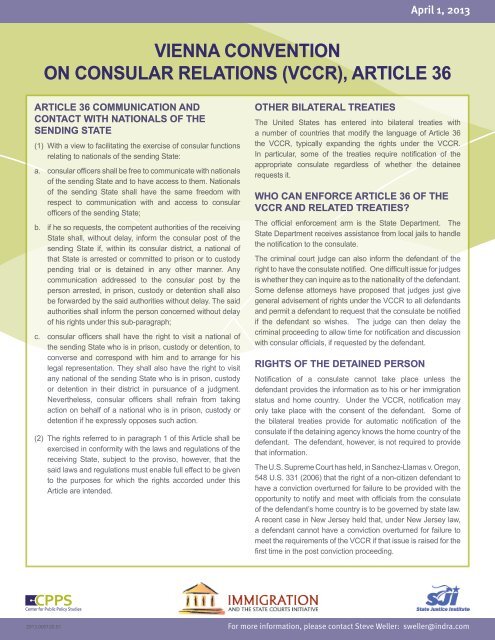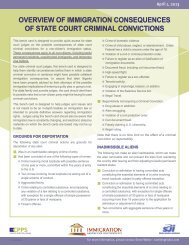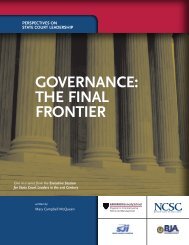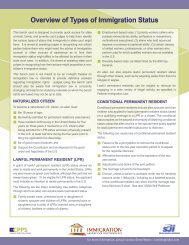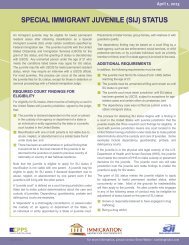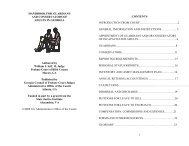VIENNA CONVENTION ON CONSULAR RELATIONS (VCCR ...
VIENNA CONVENTION ON CONSULAR RELATIONS (VCCR ...
VIENNA CONVENTION ON CONSULAR RELATIONS (VCCR ...
- No tags were found...
You also want an ePaper? Increase the reach of your titles
YUMPU automatically turns print PDFs into web optimized ePapers that Google loves.
DRAFTApril 1, 2013<strong>VIENNA</strong> <strong>C<strong>ON</strong>VENTI<strong>ON</strong></strong><strong>ON</strong> C<strong>ON</strong>SULAR RELATI<strong>ON</strong>S (<strong>VCCR</strong>), ARTICLE 36Article 36 Communication andContact with Nationals of theSending State(1) With a view to facilitating the exercise of consular functionsrelating to nationals of the sending State:a. consular officers shall be free to communicate with nationalsof the sending State and to have access to them. Nationalsof the sending State shall have the same freedom withrespect to communication with and access to consularofficers of the sending State;b. if he so requests, the competent authorities of the receivingState shall, without delay, inform the consular post of thesending State if, within its consular district, a national ofthat State is arrested or committed to prison or to custodypending trial or is detained in any other manner. Anycommunication addressed to the consular post by theperson arrested, in prison, custody or detention shall alsobe forwarded by the said authorities without delay. The saidauthorities shall inform the person concerned without delayof his rights under this sub-paragraph;c. consular officers shall have the right to visit a national ofthe sending State who is in prison, custody or detention, toconverse and correspond with him and to arrange for hislegal representation. They shall also have the right to visitany national of the sending State who is in prison, custodyor detention in their district in pursuance of a judgment.Nevertheless, consular officers shall refrain from takingaction on behalf of a national who is in prison, custody ordetention if he expressly opposes such action.(2) The rights referred to in paragraph 1 of this Article shall beexercised in conformity with the laws and regulations of thereceiving State, subject to the proviso, however, that thesaid laws and regulations must enable full effect to be givento the purposes for which the rights accorded under thisArticle are intended.Other Bilateral TreatiesThe United States has entered into bilateral treaties witha number of countries that modify the language of Article 36the <strong>VCCR</strong>, typically expanding the rights under the <strong>VCCR</strong>.In particular, some of the treaties require notification of theappropriate consulate regardless of whether the detaineerequests it.Who Can Enforce Article 36 of the<strong>VCCR</strong> and Related Treaties?The official enforcement arm is the State Department. TheState Department receives assistance from local jails to handlethe notification to the consulate.The criminal court judge can also inform the defendant of theright to have the consulate notified. One difficult issue for judgesis whether they can inquire as to the nationality of the defendant.Some defense attorneys have proposed that judges just givegeneral advisement of rights under the <strong>VCCR</strong> to all defendantsand permit a defendant to request that the consulate be notifiedif the defendant so wishes. The judge can then delay thecriminal proceeding to allow time for notification and discussionwith consular officials, if requested by the defendant.Rights of the Detained PersonNotification of a consulate cannot take place unless thedefendant provides the information as to his or her immigrationstatus and home country. Under the <strong>VCCR</strong>, notification mayonly take place with the consent of the defendant. Some ofthe bilateral treaties provide for automatic notification of theconsulate if the detaining agency knows the home country of thedefendant. The defendant, however, is not required to providethat information.The U.S. Supreme Court has held, in Sanchez-Llamas v. Oregon,548 U.S. 331 (2006) that the right of a non-citizen defendant tohave a conviction overturned for failure to be provided with theopportunity to notify and meet with officials from the consulateof the defendant’s home country is to be governed by state law.A recent case in New Jersey held that, under New Jersey law,a defendant cannot have a conviction overturned for failure tomeet the requirements of the <strong>VCCR</strong> if that issue is raised for thefirst time in the post conviction proceeding.2013.000120.01For more information, please contact Steve Weller: sweller@indra.com
DRAFT


